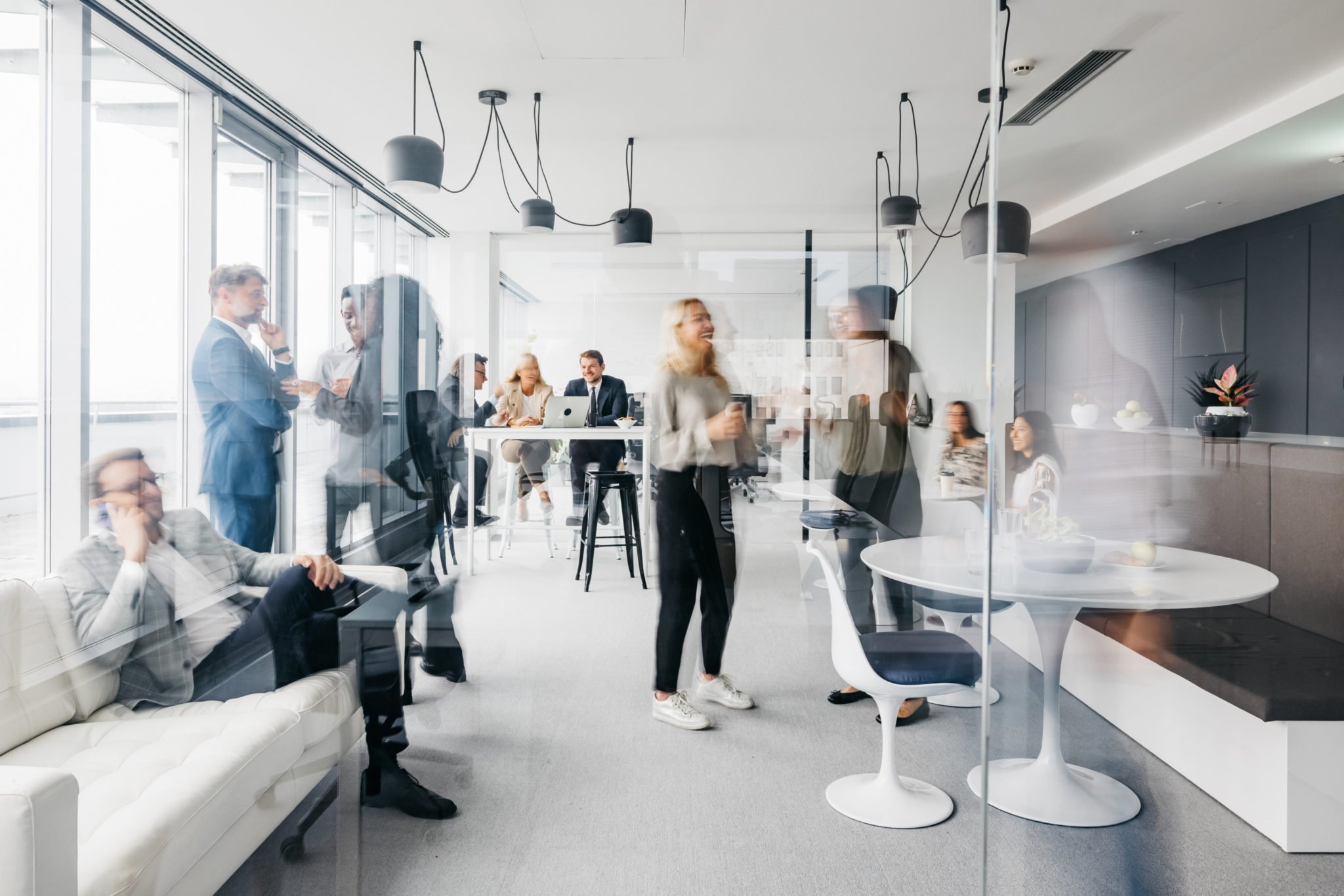It seems we’ve finally arrived at a moment long delayed: The majority of the population is vaccinated, Covid restrictions are mostly lifted, and companies are having people come back to the office—no, but for real this time.
The return-to-office debate has dominated cultural chatter for close to three years now—after so much time at home, a lot of workers just don’t want to go back. Of course, there are some employees who are overjoyed to return, as well as offices that haven’t instituted a mandatory return policy or are now fully remote. But many of the DC-area companies that are asking people to come back are trying to make the transition as smooth as possible via employees perks or beefing up their offices to make them more appealing.
When Covid hit, the nonprofit DC Youth Orchestra Program sent its employees home. The group used to sublet downtown office space, but when its lease was up for renewal in June 2020, they let it expire to save costs because no one was coming in, says its development director Betsy Purves.
As time passed and nonprofit higher-ups began thinking about next steps, they decided to look at coworking spaces—not only because of the flexible leases, but also because the typical coworking accouterments (cold brew and beer on tap, snacks, cool decor) might garner excitement about a return to office life. ”We really wanted to make sure that if we were asking people to come back into an office, even if it was just one or two days a week, that it was as little of a drag as possible,” says Purves.
The group won a competition for a free WeWork contract in August, and since then, employees have been asked to come in one day a week and are encouraged to come in a second day, says Purves. To sweeten the deal, the nonprofit is also paying for employees’ parking two days a week and giving SmarTrip benefits.
While, like at any group, there are some employees who would rather be remote forever, the incentives do seem to be easing the transition to in-office, says Purves. Pre-Covid, employees came into the non-profit full-time, but Purves expects that it will stay hybrid indefinitely, as well as continue to be based out of a coworking space after its WeWork contract is up.
Meanwhile, an employee at the law firm WilmerHale’s DC office, says the group is providing the ultimate corporate-America perk for those who show up: You can now wear jeans, people! The firm’s current policy is that people come in twice a week, although it isn’t strictly enforced, says the employee, but the whole denim thing seems to be incentivizing staff: “Who wants to have to get stuff dry cleaned and go to the dry cleaner?” The employee says they’ve even seen the most spectacular of sightings: lawyers showing up to work in shorts.
And Robert Weller, who is a trade association engineer living in Southwest DC, says his Washington-area company is strongly encouraging everyone to come in at least three days a week. As an incentive, it’s offering free parking, flexible hours for commuting, and happy hours on Thursdays.
While Weller thinks it’s too early to tell for sure if these incentives are significantly luring back his coworkers, he says they seem like effective ways to eliminate barriers to return-to-work. “Parking in DC is expensive, and if you can save 30 or 40 bucks a day or hundreds of dollars a month, that’s one less thing you can complain about in terms of returning to the office.”
Weller’s employer isn’t an anomaly: Many local companies are trying to lure workers back with the classic office siren song—free food and drinks, says Meagan McKechnie, RSVP Catering’s executive vice president of sales and marketing.
Many DC-area groups are providing free lunch to employees about three times a week and happy hours once or twice a month, says McKechnie. While this trend started in the spring, the catering group has seen a recent uptick in requests post-Labor Day as more companies began requiring in-office work.
And corporate events are getting special treatment, too. “Some of these companies did really well throughout the pandemic, and they have budgets going back since 2020 that they haven’t used,” says McKechnie. While companies would typically just have an annual holiday party and call it quits, over the summer, some groups hosted catered picnics at Loudoun County wineries or parties at indoor race tracks in Northern Virginia. Moët Hennessy even hosted its area sales meeting in a rented McLean mansion this spring, says McKechnie, where employees talked numbers over “elevated” food-and-drink pairings.
“We’re getting requests for higher-end stuff, for sure,” says McKechnie—think C-suite executive nixing traditional boxed sandwiches at meetings in favor of artfully arranged hot food served on china or special ordering wines for client dinners. “People are definitely going Gatsby.”
Rethinking the Office
Some companies realized that Covid was the perfect time to reconsider the office—what it looks and feels like, how it’s tailored to employees, or whether it’s necessary to have one at all.
As some businesses ask employees to come back to work in person, it’s essential that they have a space that’s attractive to people who’ve grown accustomed to working from home over the last few years, says Kyle Schoppmann, who’s based in DC as commercial real estate group CBRE’S Mid-Atlantic president. “In a market that is slow from an office standpoint, flight to quality and going to new construction has been a key driver for a lot of the deals that have been done recently,” she says. “It allows some of these clients to take a space and really create something special now post-Covid.”
It’s crucial that offices today have great amenities, technology tailored for hybrid workspaces, and spaces that encourage face-to-face interaction in order to bring workers in, says Schoppman—in fact, 73 percent of companies that changed DC-area offices between July 2020 and July 2022 moved into a higher-quality building, according to CBRE data.
Clients are increasingly focused on wellness amenities such as rooftop decks, outdoor space, and fitness centers and yoga rooms, she says, as well as communal spaces where they can hold programming and events that get people on site. ”It’s one more way that it differentiates this from being at home or anywhere else that somebody could work in today’s world,” she says.
For instance, companies like the American Bankers Association (ABA), Biotechnology Innovation Organization (BIO), and Cushman & Wakefield moved to higher-quality offices over the course of Covid. ABA upgraded to a building with a 360-degree-view conference room and an indoor-outdoor lounge on its roof, and BIO moved to a newly renovated building with a state-of-the-art gym and an outdoor bar and game room. Meanwhile, Cushman & Wakefield is using its new office as a way to experiment how it might design its other offices in a post-Covid world—the vibe is more hospitality-focused than traditional office space, with comfy communal spaces and a hangout area with a pool table.
And while mixed-use developments like Union Market or the Wharf were already becoming popular places for companies to base offices (think Williams & Connolly and Marriott, which both announced HQ moves to live-play-work areas pre-Covid), the idea has become more desirable thanks to the pandemic, says Francisco Gonzalez, co-managing director of design firm Gensler’s DC office. After all, it’s much easier to entice people to come back to the office when said office is located below their apartments in bustling areas close to restaurants, coffee shops, and bars—think TikTok’s Union Market office, which it leased last year.
“Our clients are incredibly interested, obviously, in talent, and they’re willing to move their offices to where the talent lives,” says Gonzalez. “They know that those individuals are willing to walk eight-to-ten minutes to the office. They don’t want to ride 40 minutes in a car or on a subway.”
That’s in contrast to downtown DC, an area where a majority of city offices were concentrated pre-Covid but where workers didn’t necessarily want to live. (But perhaps not for long—now-empty downtown office buildings are being turned into apartments.)
And Gonzalez echoes Schoppmann’s sentiment that amenities will become even more important as groups try to get bodies in the office, pointing to things like daycare for babies of both the human and fur varieties as elements offices might want to include. (Yes, that’s correct—doggie daycares might become a thing at your office, says Gonzalez.)
Office perks and upgrades aside, Gonzalez and Schoppman emphasize that the overall future of work is still being decided. ”I hear, like, ‘the new normal,’ ‘the new baseline,’” says Schoppman. “I feel it’s ‘the next normal,’ ‘the next baseline,’ because we’re not there yet.”



















